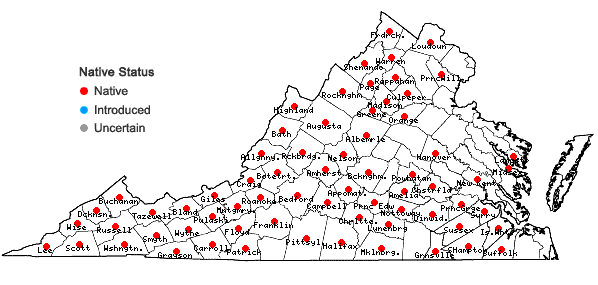Solidago arguta Ait.

Show image without county labels
Detail
- Family
- Asteraceae
- Botanical Name
- Solidago arguta Ait.
- Common Name
- Sharp-leaved Goldenrod, Cut-leaved Goldenrod
- Synonym(s)
- Flora of Virginia Name/Status
- Solidago arguta Aiton var. arguta + S. arguta Aiton var. caroliniana A. Gray
- Comments
- The map represents all records for the species and its two traditional varieties, var. arguta and var. caroliniana. Flora of the Southeastern U.S. (Weakley et al. 2023) follows Semple and Beck (2021, Phytoneuron 2021-10. 1-6) and Semple et al. (2021, Phytoneuron 2021-20: 1–56) in treating the two traditional vars. of S. arguta as species. Although the two taxa have ranges with different geographic centrums, they are broadly sympatric in much of Virginia and can be very difficult to distinguish. In its classic form, var. arguta is a relatively coarse plant with broad, heavily toothed basal and lower leaves, and completely glabrous achenes. By contrast, classic specimens of var. caroliniana are relatively slender with narrower leaves and conspicuously pubescent achenes. However, both the foliage characters and achene vestiture are highly variable; in particularly, the pubescence on achenes of var. caroliniana can vary from uniform to only at the tip, from long to very short, and from moderately dense to very sparse (literally one to a few hairs) and hard to detect except on mature, fruiting individuals. The Vascular Plants of North Carolina website (LeGrand and Sorrie) also warns that "some plants and populations will not key cleanly." Given that the both the foliage morphologies and achene vestitute seem to intergrade continuously, it seems prudent to retain the traditional varietal treatment pending further study. See additional comments accompanying the two varietal maps.
- Habitat
- Mesic to dry upland forests, woodlands, barrens, clearings, and meadows. The species is common in the mountains and infrequent in the Piedmont and Coastal Plain.
- Native Status
- Native
To save this map, right-click (control-click for Mac users) on the map and choose "Save Image As...".


